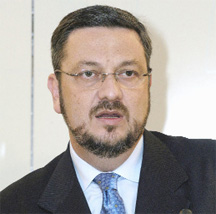BRASILIA, (Reuters) – Revelations of a surge in the personal wealth of the Brazilian government’s influential chief of staff seem unlikely to cost him his job but could drag on and become a major headache for President Dilma Rousseff.
Although there is no evidence of wrongdoing by Antonio Palocci, he is by far the highest-profile minister to be tarred by scandal since center-left Rousseff was sworn in on Jan. 1.
Opposition lawmakers have leaped upon a report in the Folha de Sao Paulo newspaper on Sunday that detailed a 20-fold rise in the wealth of Palocci, a favorite on Wall Street and a key economic policy-maker in Rousseff’s government.

The story did not allege any crime by the minister, who says the money was legitimately earned through the economic consulting firm he ran while working as a federal deputy from 2006 to 2010. But it has sparked opposition calls for Palocci, who quit as finance minister over a separate scandal in early 2006, to disclose full details of the consulting firms’ clients to prove that he did not use the firm to peddle influence.
The current allegations do not appear strong enough to seriously undermine Palocci or cost him his job but financial markets could take a hit if proof emerges of financial wrongdoing. The 50-year-old is seen as the strongest voice of economic orthodoxy in Rousseff’s cabinet. He has advocated tighter monetary and fiscal policy to tame high inflation that has plagued Brazil’s booming economy this year. “They’ll need to dig up more dirt. The dirt that they found isn’t that bad,” said David Fleischer, a politics professor at the University of Brasilia.
Even if the allegations go nowhere, they are an unwelcome return of the scent of scandal surrounding Palocci ever since his ignominious resignation from the previous government of president Luiz Inacio Lula da Silva.
The distraction of a scandal could further slow Rousseff’s reform agenda in Congress, which includes a business-friendly tax reform and a crucial law to determine revenue-sharing from the exploitation of huge oil reserves.
CALLS FOR
DISCLOSURE
Opposition parties, who have yet to land major blows on Rousseff since she was sworn in on Jan. 1, have asked tax authorities for information about the consulting firm’s operations and called on Palocci to disclose the identities of his clients. The country’s top public prosecutor said on Tuesday that a “careful eye” should be kept on Palocci’s wealth, but stopped short of launching an investigation.
Under Brazilian law, lawmakers are allowed to profit from their private businesses while they are in Congress.
Palocci’s office issued a statement on Tuesday noting that 273 current deputies and senators are involved in commercial activity and that many former ministers have gone on to earn high salaries in the private sector.
“Having passed through the finance ministry, the BNDES (Brazil’s national development bank) or the central bank brings a unique experience that gives enormous market value to these professionals,” the statement said.
It said that his income was fully documented in his tax statements and that he had taken all steps to avoid conflicts of interest. Confidenti-ality agreements with clients prevents him from releasing their identities, his office said.
“If it went to court, a judge could oblige that (disclosure) but I’m not sure they’re going to get to that point,” said Fleischer.




